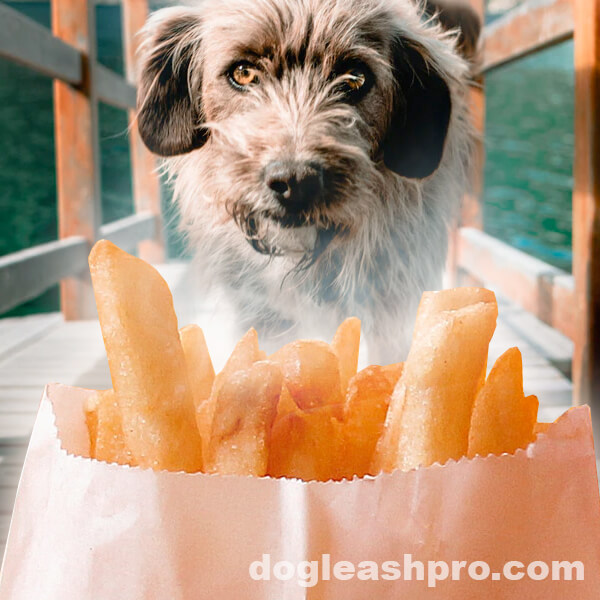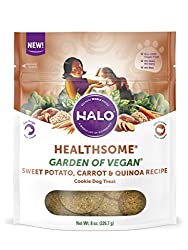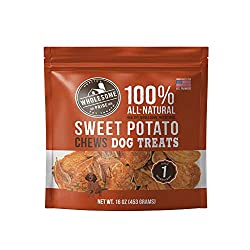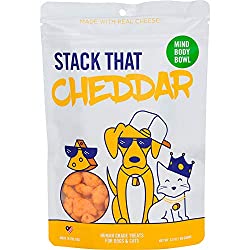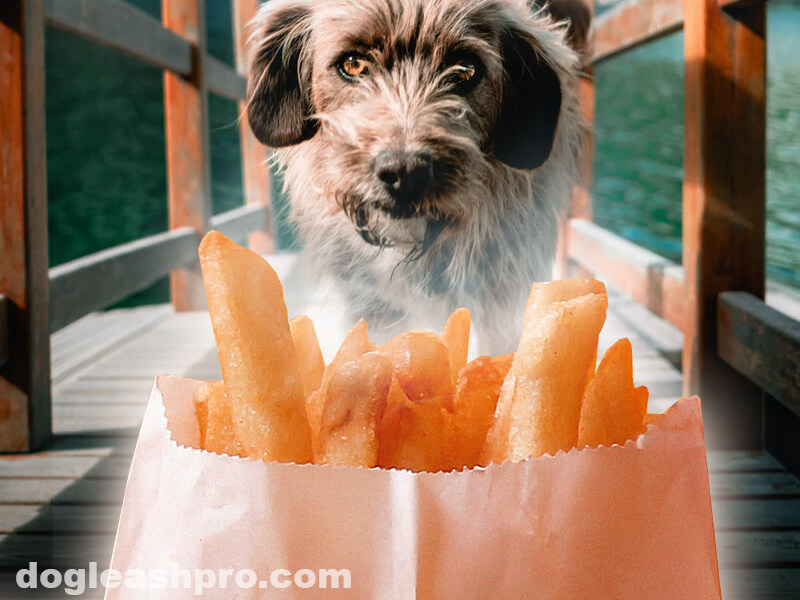
Last weekend I bought a large steaming container of Hot chips (Hot fries) and it goes without saying the moment I walked through the door my dog was interested in digging in with me! Like with most human junk foods this type of food is less than ideal for our canine companions. Salty and starchy foods that are made for human consumption can sometimes be harmful in a number of different ways to our dogs.
Can dogs eat Hot chips or Hot fries? No, dogs should not eat Hot chips or Hot fries. Hot chips also known as Hot fries are not suitable for dogs and they can cause a number of immediate and long-term health issues. Since the chips are still piping hot, your furry friends may immediately burn their mouths, tongue, and throat. Generally, dogs do not chew and just swallow their food. They may also get salt poisoning from the high level of salt in the chips. Eating Hot chips regularly can also cause canine obesity.
If you must give your pooch this piping hot treat, make sure it is cooled down to room temperature first. This will prevent your furry friend from burning his or her mouth. Try to remove as much salt from the Hot chips or Hot fries as well before feeding it to your pup.
Remember, dogs will eat just about anything without a second thought, that’s why it’s our responsibility as dog owners to be ever so vigilant about what we feed our furry companions.
Table of Contents
Can dogs eat Hot chips or Hot fries?
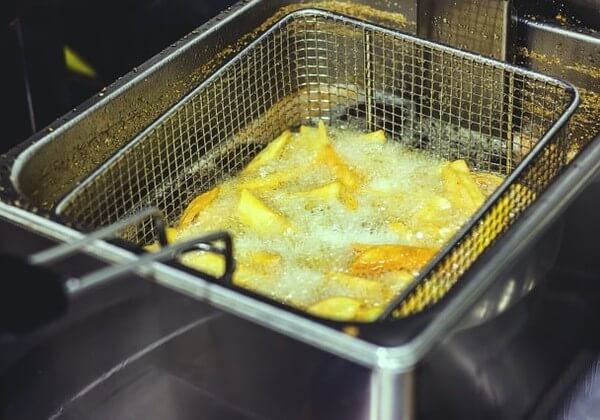
No, dogs should wait until the chips cool down to room temperature first before eating them. Dogs love human food (and food in general) and will get very excited when you bring home that steaming bag of Hot chips (Hot fries). While dogs can eat room temperature junk food (though they should not be eating junk food at all, period!) giving them food that is still hot and steaming is a big no-no.
Just because dogs can technically eat the underlying ingredients in the Hot chips or Hot fries in moderation, it doesn’t mean that they should be given these foods. Their digestive systems are not designed to digest this sort of highly processed food.
Hot fries and Hot chips health risks to dogs
Hot chips or Hot fries are a loaded bag when it comes to potentially harmful effects to your canine friends. Below is a list of health risks your pooch may experience as a result of eating Hot fries or Hot chips. All of these health threats are totally avoidable by simply not feeding Hot fries to your furry family members.
Dogs can get mouth burns
While Hot chips or Hot fries may not be hot enough to cause serious burns to your dogs’ mouths and gums, they can still potentially be hot enough to burn them to a lesser degree. Low-intensity burns can cause blistering and swelling around your dog’s mouth and inside of their mouth.
Salt poisoning in dogs
Depending on the size of your pooch, too much salt can be harmful and can lead to sodium poisoning. If you suspect your furry family member has sodium poisoning, be sure to contact your veterinarian immediately. Below is a rough estimate of the amount of salt a dog can ingest based on his or her weight.
High-fat content food is unhealthy for dogs
Fatty junk foods (like Hot chips) can lead to obesity in dogs if they consume over their fat and calorie intake limit frequently. Being overweight opens the dog up to more serious health conditions like diabetes, certain forms of cancer, and weight-related diseases such as heart failure.
What to do if your dog wants some of your Hot fries or Hot chips
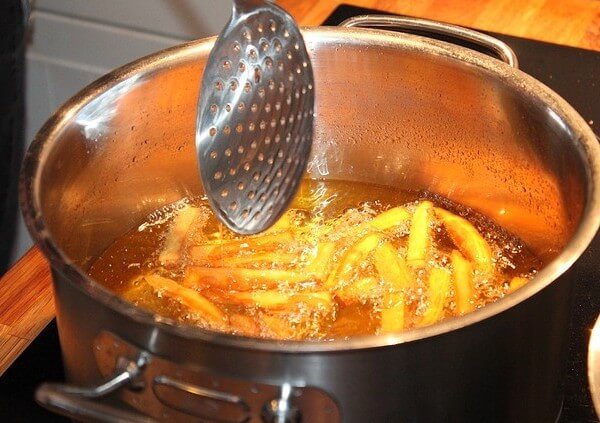
We all know the look your dogs have when they want some of that tasty human food. It’s a hard thing for a dog owner to say no to those puppy dog eyes and most of us give in and share our food.
In this case, patience is key and restraint is paramount. Those tasty steamy Hot chips or Hot fries can lead to some temporary discomfort for your dog’s mouth and tummy, so it’s best to be cautious.
If you must share with your canine companion, it’s important that you cool down the starchy treat to room temperature first so that it doesn’t burn your dog’s mouth. Some preparation goes a long way here especially if you know you will be eating your Hot chips or Hot fries in front of your canine companion.
Here’s what you can do if you bring home a steaming hot container of chips or fries:
First, you can throw some of those steaming hot treats in the refrigerator or freezer to cool down when you arrive home so that by the time you’re digging into them you have a small stash to share with your K9.
Alternatively, if you don’t plan to share the Hot chips or Hot fries with your pooch, you can place them on a high countertop where your dogs can’t reach them. It’s best to avoid leaving Hot fries or Hot chips out on the table, especially around larger dogs that can jump up and eat them when you are not looking. Depending on the size of your furry friends, the sodium content level of junk foods can be life-threatening.
Lastly, as with any other food not meant for doggy consumption, you should take care to not overfeed your canine companion. Aside from being hot and potentially burning your dog’s mouth, this salty potato snack can be loaded with sodium and fats that are also harmful to your four-legged friends.
Treating your dog after eating Hot chips or Hot fries
If you give your dog any type of hot food, they will swallow it up without thinking. In the case of Hot fries or Hot chips, the danger here is instant. Your pups will receive some kind of first-degree burns to their mouth.
While these types of burns are not normally life-threatening, they can cause your furry pals to be in a significant amount of pain, especially when they are eating. If it is a simple first-degree burn, your pups will get some blisters and redness around their mouth and possibly gums.
When this happens, it’s important to jump into high gear and get your dog treated as soon as possible. The good news is that in most cases this can be done right in your home and doesn’t require any special equipment or training.
Our goal here is to decrease the severity and duration of the burn to your dog’s lips, mouth, and tongue. The burn has already happened and there isn’t much we can do about that now, but we can treat the symptoms and make your dog more comfortable and help them recover faster.
Soothing your dog’s mouth burn
In order to decrease the level of the burn, you will need to flush some cold water through your dog’s mouth. Get a cup and use that to rinse your dog’s mouth for about 15 to 20 minutes. This should decrease the swelling and blistering in your dog’s mouth as well as soothe some of the pain.
Another good way to get your pups to cool their mouth is to feed them cold dog food in a cold slurry coupled with chilled drinking water. You can do this in conjunction with mouth rinsing.
When to contact your dog’s veterinarian
Regardless of the severity of your dog’s burn, you should reach out to your veterinarian for professional advice if you notice the following:
- Your pooch acting strangely.
- Dog’s fur falling out or having charred skin which turns white.
Please contact your veterinarian immediately as this could indicate a more serious burn that might be life-threatening.
Can dogs die from eating Hot Fries or Hot Chips?

While it is unlikely your dog will die from eating Hot chips or Hot fries, that does not mean that you should be giving them this salty fattening food regularly even if you think they are cool enough for dog consumption.
The thing with dogs is that they will eat literally anything, even things that might hurt them. If your furry family member gets into a bag of steaming Hot chips or Hot fries, there could be some unpleasant results. Your furry pal won’t think twice so it is up to you to be the responsible dog owner and watch out for their health.
The main thing to watch out for with Hot fries or Hot chips is the potential for mouth burns and the possibility of your dog getting salt poisoning. This starchy snack is also loaded with bad fats which could lead to a number of health issues down the road if they consume this junk food frequently.
Dog-friendly alternatives to Hot Chips or Hot Fries
Instead of feeding your pooch Hot fries or Hot chips, there are plenty of canine-friendly snack options they can have such as the ones below. We give these to our four-legged friends when my family and I have Hot fries or Hot chips.
So, can dogs eat Hot chips or Hot fries?
Dogs love to eat and they will eat almost anything and everything we offer them. The problem is most of the food we eat in our everyday lives is loaded with ingredients and additives that are bad for our K9’s health.
Hot food like Hot chips or Hot fries can seem like an irresistible treat for your pups, but the dangers of giving them hot foods far outweigh the momentary pleasure of seeing your dog inhale that food as if their life depended on it.
Being a responsible dog owner means knowing when to say no and this should be one of those clear no-go moments.
Related Questions
Hot chips and hot food are not ok for dogs to eat immediately. It’s best to let the food cool down a bit to room temperature before allowing your pooch to eat it. If the fries or chips are boiling or steaming hot, it can cause burns to the dog’s mouth and we don’t want that.
Make sure the chips are dog-friendly food. If they are fries, then that is not good for dogs. Fries are loaded full of salt which can damage your dog’s kidney if eaten regularly. Not only that, when fries are hot, they can cause first-degree burns to the roof of your dog’s mouth.
DISCLAIMER: THIS WEBSITE DOES NOT PROVIDE MEDICAL ADVICE
The information, including but not limited to, text, graphics, images and other material contained on this website are for informational purposes only. No material on this site is intended to be a substitute for professional veterinary advice, diagnosis, or treatment. Always seek the advice of your veterinarian or other qualified health care provider with any questions you may have regarding dietary needs.
Resources:
https://vcahospitals.com/know-your-pet/burns-in-dogs
https://www.petmd.com/dog/emergency/accidents-injuries/e_dg_burns_and_scalding

With over five years of specialized experience as an animal writer, my expertise lies in dog nutrition, health, behavior, grooming, and training. I am dedicated to delivering helpful and informative content that caters to the well-being of our furry friends. My primary goal is to empower pet owners with knowledge and ensure our canine companions thrive in health and happiness. In my free time, I love volunteering at local dog rescue centers.
